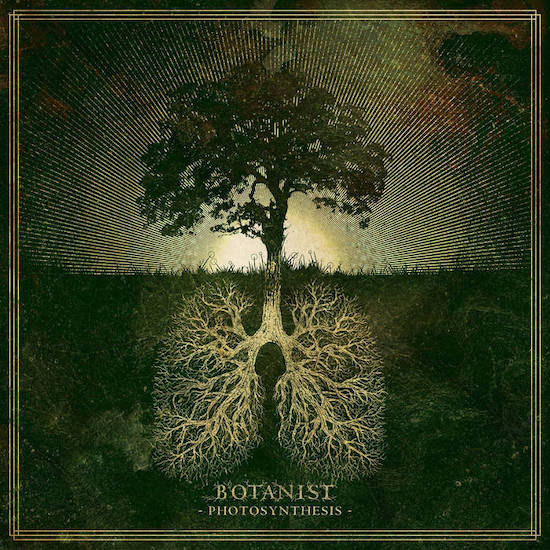In the natural world, photosynthesis is a process begun when plants take in carbon dioxide and water. The water is then oxidized, and the carbon dioxide is reduced. This turns the water in oxygen and the carbon dioxide into glucose, which creates the energy the plant needs to grow. The oxygen is released into the air and the energy is stored in glucose molecules. Or so I can remember from GCSE science (thanks Mrs Bailey). It’s through this process that plants can be considered the lungs of the planet. Much like their previous releases, avant-garde metal outfit Botanist have taken this idea and created a concept album around it. As usual the protagonist of the album is a botanist who has gone insane from witnessing the destruction of the natural world at the hand of man. Botanist take hammered dulcimers – water – and a tight rhythm section – carbon dioxide – and create music that is full of propulsive energy.
Photosynthesis is an album that opens with a sombre hammered dulcimer over blast beats. It feels like a metal album but also not at the same time. The use of the hammered dulcimer is a master stroke. They have a set sound that really lends itself to the music Botanist make, but when you can hear the string actually being hammered if adds an extra layer to the song.
When the vocals come in the album starts to feel expansive. ‘Water’ is the track that really tricks you the most. It starts slow, then searing riffs explode from the speakers. There is a delightful drone just below the surface that really grounds the song and allows the pummelling beats to shine. Then, there is a change in pace and tone. The music starts to swell and the vocals appear. From this point the music becomes catchier. Botanist have some killer hooks in store for us. The music doesn’t become poppy or less brutalist, but there is a subtle change. As the vocals swell with the keyboards the album starts to skew from a metal affair into a post-rock/shoegaze one. There is a giddy delight from witnessing the metamorphosis. You can also hear the delight in the voice of lead singer Otrebor (né Roberto Martinelli). However, this isn’t the best part of ‘Water’. Oh no. That is reserved for around two thirds of the way through.
After an instrumental section Otrebor starts to sing again. The backing track feels like two pieces of music have been stitched together. One precise and hard hitting. The second wonky and gleeful. There are moments during this final third where the second part feels like it will untether itself and run amok. Luckily, this doesn’t happen. Instead we listen to the final throes of the song, unsure what will happen. Will it make it to the finish line as planned or will it all collapse in a deliriously writhing heap? ‘Stroma’ takes this blueprint but prolongs the melodic moments. Here Botanist really seem to have fun here shifting between tone and pace.
Photosynthesis plays with the conventions of metal, using them to create something fresh and exciting. The switch between metal and dark shoegazing is a masterstroke and stops the album from being a one trick pony. Instead it has a diversity of sound that really lends itself to repeat listens. Yes, there are a few moments when the hammered dulcimer sounds a tad too twee and you just want a massive searing guitar solo – as we’ve been conditioned to want – but the fact it doesn’t come is what makes the album to delightful. We are given everything we expect from a metal album but without a guitar being used.
There are sections here that remind me of the Mahavishnu Orchestra’s interplays, Spectre’s wall of dank noise, The Beta Band and Of Arrowe Hill’s use of harmonies. Liturgy, Leprous and a host of other experimental/avant-garde metal bands also come to mind due to their ability to shift from one sound to another with such visceral power. Photosynthesis is a rewarding album that will delight metal heads as well as fans of experimental music. It treads a fine line between being incredible and preachy. Luckily, the music makes up for any lyrical inconstancies. Play loud, play often, plant trees is the overriding message here.


